Savannah cats are a large, athletic breed that’s especially affectionate with their owners, but can be a bit standoffish with strangers. Learn more about this highly intelligent cat.
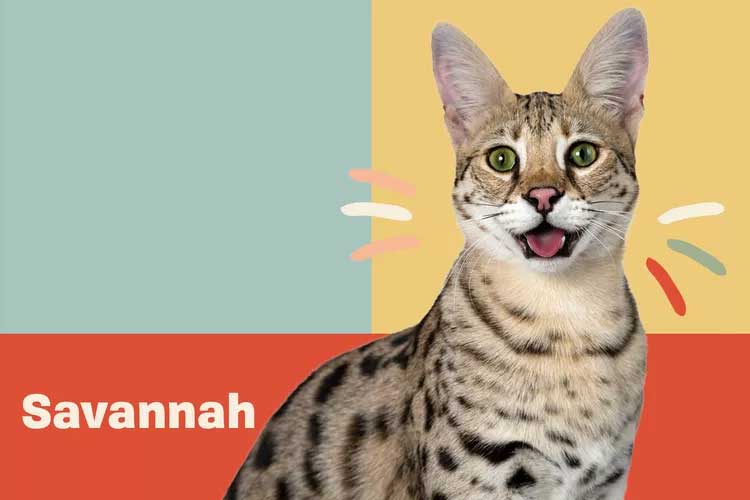
Savannah Overview
| OFFICIAL NAME | Savannah |
| COMMON NAME | Savannah |
| PET HEIGHT | 14 to 17 inches |
| PET WEIGHT | 12 to 25 pounds |
| LIFESPAN | 12 to 20 years |
| GOOD WITH | families |
| TEMPERAMENT | affectionate, bold |
| INTELLIGENCE | high |
| SHEDDING AMOUNT | normal |
| PLAYFULNESS | high |
| ENERGY LEVEL | active |
| VOCAL LEVEL | frequent |
| COAT LENGTH | short |
| COLORS | black / ebony, chocolate / brown / sable, lavender / silver |
| PATTERNS | solid, tabby |
| OTHER TRAITS | easy to groom, easy to train, friendly toward humans, friendly toward other pets, highly territorial, high prey drive, strong loyalty tendencies |
Tall and elegant, the Savannah cat was first introduced in the late 20th century. Savannahs are actually a hybrid breed, the result of breeding a Siamese cat with a wild serval. And that wildness is on full display: The breed retains the large perked ears, long legs, and spotted coat of its African cat heritage, while keeping the friendly demeanor of a domestic pet.
One thing to know about Savannahs: These kitties are big. Adult Savannah cats can grow up to 17 inches tall and weigh 25 pounds, depending on generation. First generation crosses (called F1 and F2) are generally larger than later crosses and have beautiful spotted coats in shades of brown, tan, and black. Later generations are further removed from their wild ancestor, yet retain the colors and patterns of earlier generations—they're just smaller and a bit more docile. Savannah cats are loyal, intelligent, and inquisitive kitties, but might not be the best choice for first-time cat owners.
Though they were introduced a couple decades ago, Savannah cats are still a relatively rare breed. A few states even have restrictions on them, often depending on generation. Checking state ordinances is a good idea before bringing home a Savannah cat.
Appearance
Talk about elegance! The Savannah cat's tall, lean body and striking spotted coat make these gorgeous animals look a bit like miniature cheetahs. Savannahs can stand 17 inches tall and have been crowned the world's tallest domestic cat by the Guinness Book of World Records. Male Savannahs can weigh as much as 25 pounds, while females can be as light as 12 pounds. Their height and weight are totally dependent on how many generations removed an individual cat is to her wild serval ancestor.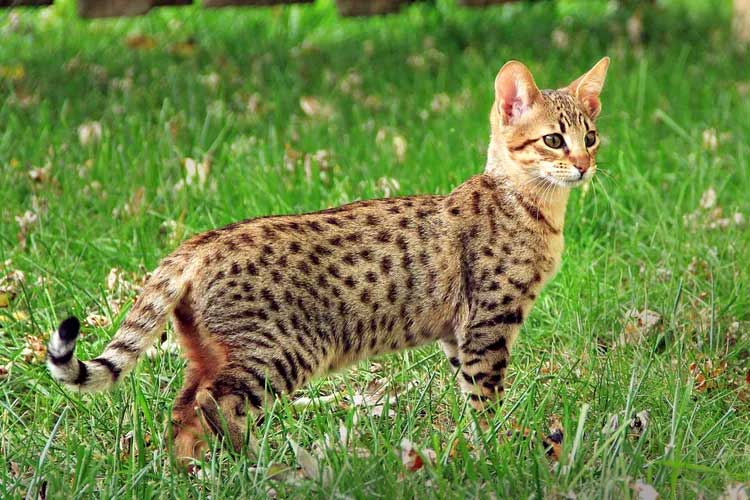
Recognized coat colors of the Savannah are black, brown spotted tabby, silver spotted tabby, and black smoke. Their coat is short, dense, and super easy to maintain with a quick brushing every week or so. Another trait that separates Savannah cats from other breeds: Their eyes. Slightly hooded and almond-shaped with a dark tear duct line, the Savannah's eyes give her a striking, friendly-yet-piercing gaze. Eye color generally reflects the coat color, but not always.
Heather Tarticchio, Savannah cat breeder behind TICA-registered St. Louis Savannahs, says it's important to do your research before bringing home a kitten.
"There are many generations, sizes, and personalities that come with [Savannah cats]," she says. "Make sure you know which generation is right for you."
Temperament
If you're looking for a lazy lap cat, a Savannah is probably not the best choice. This athletic and active feline is more likely to leap onto the top of your kitchen cabinets (Savannahs can leap an astounding 8 feet in height) than she is to sit idly by her food bowl.Always looking for new challenges to explore, the Savannah cat is often said to be more dog-like than cat-like. These lithe and agile cats also love water, and certainly won't hesitate to jump into the bathtub with you or wade around in a kiddie pool. Savannahs are also easily trained, and some owners choose to leash train their cat and take them on outdoor adventures.
Socializing your Savannah kitten is important, as these big house cats can become suspicious of strangers. But like canines, Savannahs are exceedingly loyal and will follow their favorite humans around the house simply for companionship, earning the nickname "Velcro kitties." They have a reputation as being very talkative with a variety of distinctive vocalizations, though this isn't always the case.
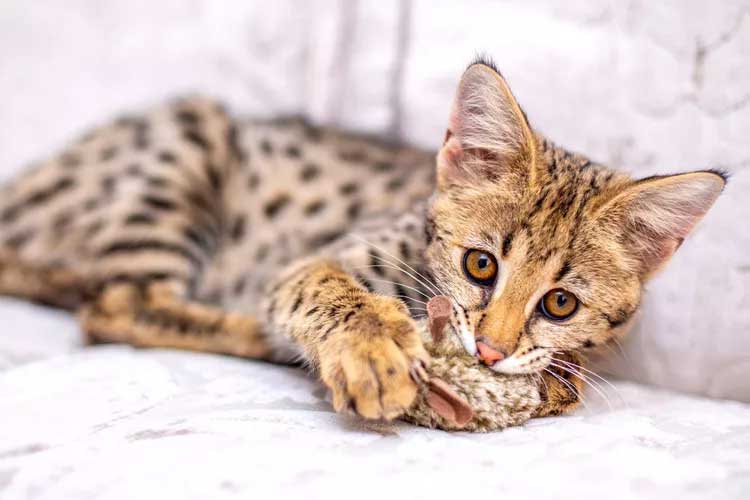
"Savannahs are great family pets for the right family," Tarticchio says. "They are high-energy and demand a lot of attention, so they are not well suited for a household where the owners are never home. That said, they will bond with any animal they are raised with, assuming that animal is receptive to their constant love. Kids and dogs make great companions for this reason."
If you're thinking about bringing home a Savannah cat, remember that litters are listed as F1, F2, F3, etc. These numbers represent how many generations have passed since the original wild serval genes were introduced into a particular line of breeding. So, the smaller the number, the more likely you'll see a bit more wild behavior (climbing, pouncing, and "hunting" their toys). And remember: Earlier generations of Savannah tend to be larger and heavier.
Marilyn Krieger, certified cat behavior consultant in San Francisco, says it's important to provide mental stimulation for all cat breeds—but especially for Savannah cats.
"Savannahs are highly intelligent and need lots of enrichment and activities," she says. Krieger recommends clicker training to help keep them mentally and physically stimulated.
Living Needs
With Savannah cats, the size of your home really doesn't matter. What does matter is whether you provide plenty of places for her to hide, run, and climb. This means having at least one cat tree and plenty of challenging, interactive toys to keep her occupied. And, because she's so active, it probably won't hurt to have several scratching posts and scratcher toys throughout your house or apartment to give her plenty of opportunities to stretch and scratch.She'll love any on-screen, cat-centric entertainment, including videos of birds and squirrels or interactive cat games on a tablet. If you have the space, your Savannah will also spend hours batting toys around a shallow pool or pan of water.
You may also want to keep all plants or breakable objects away from open shelves, where your cat can knock them down. Remember, Savannahs are capable of leaping up to 8 feet high from an almost standing position—not even the top of your refrigerator is safe from their powerful legs. They can also jump over fences, so never leave your pet outdoors unattended.
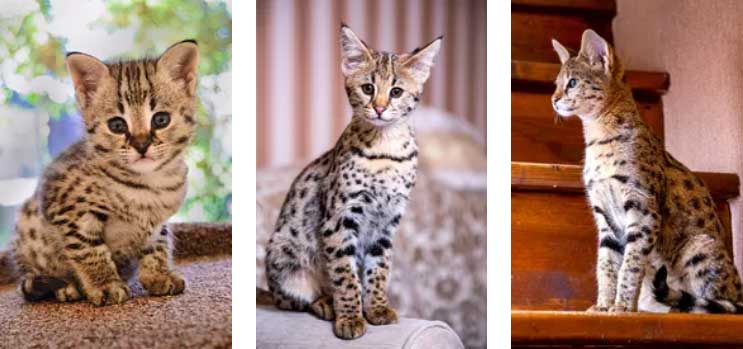
Savannah cats can get bored easily, so having a feline or canine roommate can be helpful. These social kitties don't like being left alone for long. "They would prefer their owners around 24/7," Tarticchio says. "But [Savannah cats] can do fine with owners who are gone during normal working hours."
If you can, provide them with a safe space outdoors such as a screened porch or patio (a "catio," if you will). Your Savannah will happily spend the day enjoying the fresh air and plotting how to catch squirrels, while staying safe.
But before you adopt a Savannah cat, check with your local government. Some municipalities have more restrictive ownership laws due to the kitty's wild ancestry.
Care
Aside from regular veterinary care, ample mental stimulation is the main thing your Savannah cat needs to be happy and healthy. Her short coat requires little care other than an occasional brushing to eliminate loose hair and dead skin. Like other breeds, a Savannah needs her nails trimmed regularly and good dental care. Just remember to start nail and dental care while your pet is still a kitten—that way you won't end up wrestling your (very large) full-grown Savannah when it's time for basic maintenance.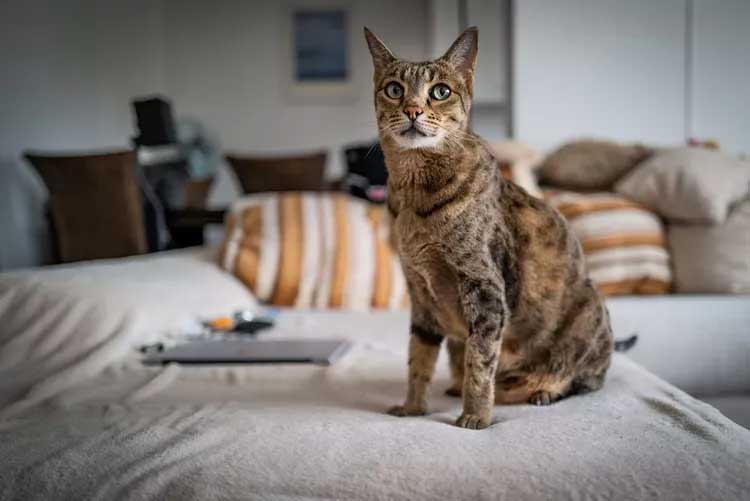
Make any grooming experience a fun one for your Savannah while she's young by offering treats or toys after every session. And, if you dream of taking your kitty on outdoor adventures, start leash training early. It's important to take baby steps and never force your kitten to do something against her will.
Health
Like all pet cats, Savannahs should be spayed or neutered as soon as your vet recommends. Male cats in the F1, F2, and F3 generations are often sterile, but neutering is still highly recommended to help curtail any undesirable behaviors that might arise.Being hybrids, Savannah cats can live a long time and there isn't a lot known about what health conditions—if any—they're prone to, though they can be susceptible to common feline ailments. They can live between 12–20 years, so when you bring home a Savannah, you're bringing home a friend for life.
History
The first Savannah cat, aptly named Savannah herself, was introduced to the world in 1986. The first member of the tribe was conceived by crossing a male wild African serval cat with a domestic Siamese cat. The resulting offspring mirrored the gorgeous spotted coat and build of the wild cat, but retained the friendly, domestic demeanor of her mom.It didn't take long for breeders to see the potential of this spectacular animal, and over the decades the numbers climbed and more generations of Savannahs were bred. In 2001, Savannah cats were recognized by the International Cat Association as an official breed.
Fun Facts
Savannah cats love water. They bravely swim where other kitties fear to go.A California Savannah cat named Scarlett’s Magic was twice named “Tallest Cat in the World” by the Guinness Book of World Records. She measured 18.07 inches tall and also was named “Longest Cat in the World’ at 42.72 inches from nose to tail.
Singer Justin Beiber reportedly spent $35,000 dollars on two Savannah cats named Tuna and Sushi.
Ralph Lauren model Valentina Zelyaeva owns a Savannah cat named Mr. B. She travels the world for her job, and he often sticks right by her side.